Canadian Property Manager Implements DNA Testing to Combat Dog Waste: A Legal and Ethical Examination

In an unprecedented move, a property manager in Burnaby, British Columbia, has mandated DNA testing of tenants’ dogs to address ongoing issues with uncollected pet waste. The controversial policy threatens eviction for tenants who refuse to comply, sparking a heated debate over legal rights, privacy concerns, and community responsibility.
The Uncollected Dog Waste Dilemma
A Growing Frustration for Property Management
Maintaining a clean and sanitary environment in multi-residential complexes is a persistent challenge. Uncollected dog waste not only poses health risks but also diminishes the quality of life for all residents. The property manager at the Burnaby apartment complex reports multiple instances where staff had to remove dog feces left in common areas, prompting the need for drastic measures.
The Impact on Residents
Residents who adhere to pet policies express frustration over the negligence of others. Uncollected waste can lead to unpleasant odors, attract pests, and create unsanitary conditions. This issue underscores the importance of responsible pet ownership in shared living spaces.
DNA Testing as a Solution
How Dog DNA Testing Works
Companies specializing in pet DNA testing, such as PooPrints Canada based in Alberta, offer services that can match dog waste to a specific animal. The process involves collecting a DNA sample from each dog, typically through a cheek swab, and maintaining a database of genetic profiles. When waste is found, it can be tested and compared against the database to identify the offending pet.
Implementation in Property Management
By implementing DNA testing, property managers aim to hold pet owners accountable for their animals. The hope is that the policy will deter negligent behavior, ensuring a cleaner environment for all residents.
Legal and Ethical Considerations
Tenant Rights and Privacy Concerns
The mandatory nature of the DNA testing policy raises significant legal questions. Tenants may argue that requiring DNA samples infringes upon their privacy rights. Currently, no Canadian laws explicitly allow landlords to compel tenants to provide pet DNA samples.
Enforcement Challenges
Without clear legal backing, enforcing such a policy may prove difficult. Tenants who refuse to comply could contest eviction notices in court. Legal experts suggest that property managers should seek voluntary compliance or explore alternative solutions.
The Precedent in Other Jurisdictions
Some condominiums and apartment complexes in the United States have successfully implemented pet DNA testing programs. However, these initiatives often involve amendments to lease agreements and clear communication with residents to ensure legality and compliance.
Alternative Approaches to Pet Waste Management
Community Engagement and Education
Educating pet owners about the importance of cleaning up after their animals can foster a greater sense of community responsibility. Hosting workshops or distributing educational materials may encourage better compliance.
Enhanced Facilities and Resources
Providing convenient access to pet waste disposal stations, complete with bags and bins, can make it easier for owners to clean up. Regular maintenance and visibility of these resources reinforce their use.
Enforcement of Existing Policies
Before resorting to DNA testing, property managers might strictly enforce existing pet policies. Issuing warnings or fines for observed violations can deter negligent behavior without infringing on privacy rights.
Conclusion
The case of the Burnaby property manager’s DNA testing mandate highlights the complex interplay between maintaining community standards and respecting individual rights. While the frustration over uncollected dog waste is understandable, solutions must balance effectiveness with legality and ethical considerations. Open dialogue between property managers and tenants, combined with educational initiatives, may offer a more harmonious path forward.
About DNAForce Inc.
At DNAForce Inc., we specialize in providing accurate and confidential DNA testing services to address a variety of needs, including paternity tests. With a commitment to scientific excellence and customer service, we help individuals and organizations find clarity through advanced genetic analysis. Visit our homepage to learn more about our services and how we can assist you.